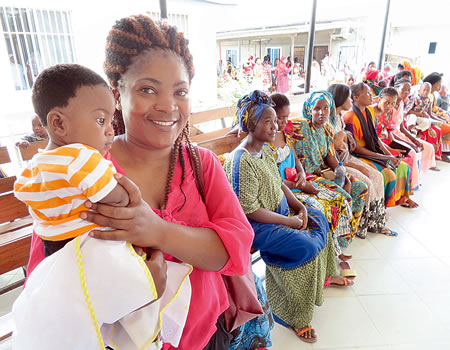NOT everyone thinks birth control is a blessing. But that is not the case with Mrs Kike Akande, a widow and mother of five, living in a suburb of Ibadan who says having few children that she could train, now that she is 65 years old, would have been better.
In her community, women have no choice when it comes to contraception. The health centre in her town only offers basic care. Childbirth spacing was not a priority for the few health workers available in this hinterland of Oyo State.
There are still over 225 million women around the world who don’t have access to the modern contraceptives they need to make these decisions for themselves.
Although most Nigerians have embraced family planning to ensure healthy and manageable families, it is not yet time to celebrate.
Evidence from Nigeria Demographic and Health Survey (NDHS) show that only 15 per cent of Nigerian women particularly those of reproductive age (15 to 49 years) use any method around the country.
In fact only 10 per cent of these women use modern family planning methods. This leaves out 16 per cent of women who want to avoid pregnancy but are not using an effective method of contraception.
“Many women are aware of contraceptives, but yet myths and misconceptions on family planning still exist till now,” said NURHI State Team Leader in Ibadan, Mrs Stella Akinso.
Poor quality of reproductive healthcare
A survey carried out in Lagos in 2015 tagged PMA2014/Lagos, found that over 67 per cent of women in the state are not accessing family planning services in public and private health facilities due to health – related concerns, issues of acceptability, accessibility and affordability as well as poor state of health facility.
Nonetheless, actors in the health sector are not sitting back just to watch figures of unwanted births escalate without applying interventions to bridge gaps in ensuring increased contraceptive rate in Nigeria.
“We came up with the 72-Hour Clinic Makeover in a facility to ensure that the status of health facility and utilisation in relation to Family Planning is improved in the 15 local government areas we had worked in as NURHI in Oyo State,” said Mrs Akinso.
The 72-Hour Clinic makeover supports the facility and community members to “make-over” the facility, ensuring that the health care centre can provide optimal family planning service in abeautiful environment.
Services in each health facility is also linked to strong community-based social mobilisation and complemented by partnerships with religious and traditional leaders as well as by teams of youth urban social mobilisers.
Unplanned pregnancy is a big problem
Unfortunately, there are still many communities that access to family planning services is still a challenge. For instance, in Northern part of Oyo State, teenage pregnancy is still a big problem, even the traditional ruler of Eruwa, confirmed this, she said. An attestation of unmet contraceptive eed.
Fortunately, different states in Nigeria are already coming up with costed Family Planning implementation plan and blue print on increasing contraceptive prevalence as well as passing bills to support reproductive health.
Dr Lanre Abass, Executive Secretary, Oyo State Primary Healthcare Board said the operational plan ensures all partners working in Oyo State on family planning, for example, can align with government’s plan to meet its unmet contraceptive need.
“If you are desirous of family planning, nothing should debar you from accessing it in terms of finance, commodities, nearness of facility for family planning,” he added.
Few years back, Oyo State did not really have a clear cut direction on family planning. “With the coming on board of many development partners, all collaborating on promoting family planning, the CPR was taken from about 10.5 per cent to 26.4 per cent for modern contraception,” Chairman, Family Planning Provider Network of Oyo State, Dr Monday Famakin, said.
The clear cut budget line for family planning and funds to procure family planning consumables by both state and local government councils, he said had contributed to the improved uptake of family planning services.
Meeting unmet contraceptive needs
However, Dr Famakin, also the Director, Primary Health Care, Ibadan North Local Government Council, said “bottlenecks, particularly the non availabililty consumables, in some public facilities really is hampering service delivery at that level.
“Private sector see family planning as a non-profit making venture; this is another major issue. But from the costed-implementation plan for family planning in the state, these issues will be addressed.”
Like many responsive leaders, achieving healthy mothers and children, Chairman, Oyo State House Committee on Health, Mr Silas Okunlola assured was the priority of legislators considering the health related bills already passed into law.
Policy, key to women’s health
Oyo Assembly had passed into law health reform bills as the private hospital bill, smoking regulation bill and the Health insurance agency bill. The reproductive health bill that is centred on ensuring wellness of mothers and children, including improved access to family planning service, is also awaiting its passage, Mr Silas Okunlola also corroborated.
Certainly, reproductive health is far more comprehensive, but Mrs Akinso assured that its family planning aspect translates to benefits also for men, the family and the country at large.
Family planning benefits outweigh birth limiting
“The father is able to provide for the family and spend quality time with his family. If they are too many, how many will he be able to give quality time and attention?
“Family planning, particularly, will facilitate the achievement of the SDGs by reducing demand for food, resources and ensuring improved standard of living. It also supports achieving universal education.
“In addition to saving cost, it contributes to the reduction in child mortality by improving maternal mortality. The truth is, when a woman dies after childbirth, her new born baby stands a 50 per cent risk of dying within the first year of life.”
Dr Emmanuel Abanida, the Executive Secretary of the Health Reform Foundation of Nigeria (HERFON), said improved child birth spacing services will ensure qualitative and wealthy nation. But adequate fund, streamlining and strengthening synergy between all stakeholders, including community members, he said remains central to preventing many unnecessary deaths in women of reproductive age group.
Access to birth control is not a religious debate; its coverage is a matter of economic justice.
WATCH TOP VIDEOS FROM NIGERIAN TRIBUNE TV
- Let’s Talk About SELF-AWARENESS
- Is Your Confidence Mistaken for Pride? Let’s talk about it
- Is Etiquette About Perfection…Or Just Not Being Rude?
- Top Psychologist Reveal 3 Signs You’re Struggling With Imposter Syndrome
- Do You Pick Up Work-Related Calls at Midnight or Never? Let’s Talk About Boundaries







